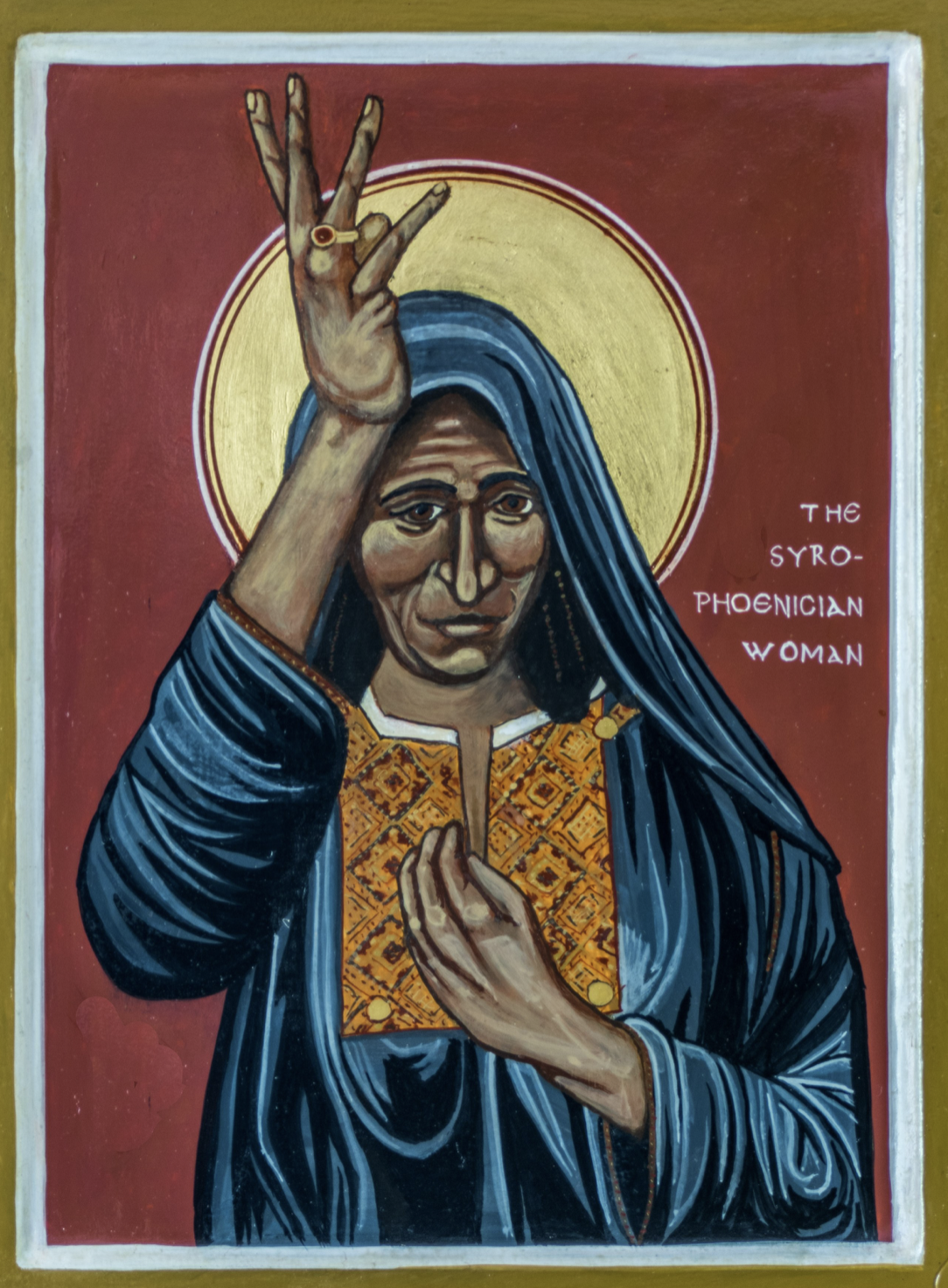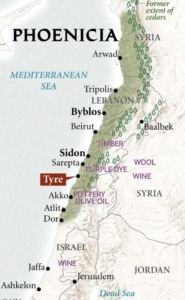
Have we ever felt so affected by an issue that we need to protest? It’s not the done thing for us perhaps? This passage from Mark’s Gospel is one which might be avoided. It portrays Jesus as possibly rude, terse at best. But if we look from the woman’s perspective we might see something very different.
The passage Mark 7:24-30 starts, “from there”, but where was Jesus?
Anyone for a custard slice later?
He had been in Jerusalem. The Pharisees had been questioning Jesus about defiled hands etc. It seems that they were more concerned with the food that they had eaten and the proper washing of hands than the ethics of the day. You know, what’s right for the society that live in, for the common good, not just the rich and influential. The Pharisees had looked back at their traditions, for the past was going to save them. But Jesus contends that the food that we eat isn’t going to make us do wrong things; however, you feel about that custard slice later after lunch. It is from within, the actions that displease God come from within – it is our choice to do wrong. It is in this that Jesus declared that all foods were clean. But who was he speaking to again? The Jews of Jerusalem.

We move back to the passage: we are now in the area of Tyre and Sidon, in the land of Syria. This is a strange place for Jesus – this isn’t Galilee or Judea, he’s out of his home turf by a long way. Tyre was the place that they produced the Temple Tax coins. Predominantly Jesus spoke with the Jews, he consistently gave emphasis on God’s promise to Israel. Jesus’ healings are part of God’s kin_dom breaking in, where Jesus calls for Israel to repent and believe: and they struggle with that.
Who is this woman?
And then this women appears. She’s Greek, according to the text, often translated as gentile. She is from Phoenicia from Syria. That instantly labels her as an outsider. Many have considered her to be a poor woman, possibly a peasant working in the rural outskirts of the city. She is also alone, there is no male escort, elderly relative to lend support. So was she a single mother in a rural agrarian setting, coming to this man called Jesus out of desperation? Well, she speaks of scraps of food to feed her daughter; it’s possibly more survival than desperation, maybe. Is there a need to protest?
Jesus, born in Nazareth, was considered to have found viable support from the construction trade in the local city of Sepphoris, a thriving Roman-influenced urban centre about 4 miles from Nazareth. He has travelled quite a distance to this area to this area of Tyre from Jerusalem, supported by quite an entourage, including the disciples and the women maybe mentioned in Luke 8:1-3. Jesus was a Jew in a foreign land.
The woman pleads with him to heal her daughter, to bring her and them back from the margins of life and death, and his response was:
“Let the children be fed first, for it is not fair to take the children’s food and throw it to the dogs” Mark 7:27
Wow! What’s your first thoughts of that? Dogs. Even in the Greek small print, calling someone a small dog isn’t going to make it sound any better.
Possibly we have been mis-reading the situation?
Tyre : a place of Gentiles surrounded by Jews
Tyre is mentioned a number of times in Scripture. Due to its trade in Temple Tax and being a lively port, although it had a predominantly Greek-influenced population, it had extensive links with Jews. In 1 Kings 21 (and 2 Kings 9:10) there’s a story about Ahab, where Jezebel, a Phoenician princess, is condemned to be eaten by dogs. It’s about a past story.
Paul goes to a community near to Tyre in Acts 21:3-7 as Herod supplied food to Tyre and Sidon. Tyre may well have been such a bustling place that in times of drought and famine, most of the food was needed in the city and not in the surrounding Jewish villages. There’s opinion that there was significant animosity between the people of Tyre and the local Jews. Was there a need to protest? Could this explain that response from Jesus?
Could the food also go to the children of Israel. A reversal of the practice of ensuring that the city got the harvest first?
“Let the children be fed first, for it is not fair to take the children’s food and throw it to the dogs”
Mark 7:27
Jesus’ response does appear to either be terse, even rude, or this has been written to convey a particular meaning. Given that Jesus didn’t heal any Gentile except in this scenario (Hooker, Morna, D., The Gospel According to St Mark, (London : A&C Black, 1997), p. 181) what’s the meaning here? The daughter is being fed, as the woman claims that the dogs are eating the crumbs.
Earlier in Mark’s Gospel Jesus has healed another daughter, Jairus’ daughter. Jairus, a prominent lay steward of the synagogue in the Decapolis, predominately Gentile territory but with Jairus of course a Jew. Why was his daughter healed? “Your faith has saved you” (Mark 5:34). So why was this woman’s daughter healed? – she was a gentile, a foreigner. Was it worth that need to protest?
Reversing the Power Imbalance
Perhaps the woman sought to reverse the power imbalance, the misogyny, between the superior male and the lonely single mother. That took a bit of guts. Perhaps the woman, possibly educated, was able to overturn the first-century conventions and defy tradition, remember the Pharisees and their longing for tradition, seeking healing for her child. It was more than healing, it gave them life, ability to re-join society, not hampered by the spectre of a demonised daughter. And note that the woman calls Jesus …Lord.
Possibly this is a story of a woman of some means who is fighting against the popular will of one ruling class over another. She stands on a boundary and wishes for equality, and she believes. Believes, even when Israel struggles, that Jesus can deliver something more than bread, life.
What emerges is a new relationship, overcoming the original difference seen by others. Perhaps we are aware of contradictory convictions, established over many decades perhaps, where our opinions are entrenched, as our others. We may not feel that we wish to broach such a topic for it might cause offence. We might stand in no man’s land, feeling uneasy – wouldn’t be easier to withdraw back to relative comfort and safety… Do we need to protest?
Orange Order…Republican
I have attended some Orange Order marches and another Republican March, to gain an understanding of the passion of the two differing opposing parties. The blue shirts and the green hooped shirts are clear lines of demarcation. When I ask whether people are willing to talk about it, there’s reticence to speak for the possibility of causing offence. But continue I will to seek to bring people together, to make that difference, albeit in areas where I work.
Climate Change
What of those fighting for climate change, where we need to make changes but “I like the way I have been doing this for years, why should I change now?” is one response. When we call for a meeting miles from each other and when an electronic format might suffice, be quicker and not burn petrol/diesel? When the price of a green product costs so much more than the plastic packaged commodity. What choice do we have?
This difficult passage, often overlooked, is one where we may all resonate with. It speaks of overcoming privilege, of crossing the border with another, of making relationships – but it is going to be costly. We are going to have to believe in this. If this is what God wants for our world, God’s world, climate change is going to be seeking us to make such significant changes, ones where we may need to make a stand. Will we? This Syro-Phoenician woman, a foreigner, did.
Takeaway
I think it’s fairly obvious. We can find comfort in church and we can also find conflict in our world – but positive conflict.
Conflict where we can engage, build relationships on many issues which can bring peace between communities – sounds a lot like kinship to me.
If Climate Change is becoming a regular feature of the news that we can tune it out, now maybe it’s a time when we re-focus, consider the love for one another, and make those changes – even at great cost. It may mean confrontation. Can we not protest? Are we up for that?
Cover photo “Syro-Phoenician Woman” from Twitter


I loved the reading dialogue it was very interesting